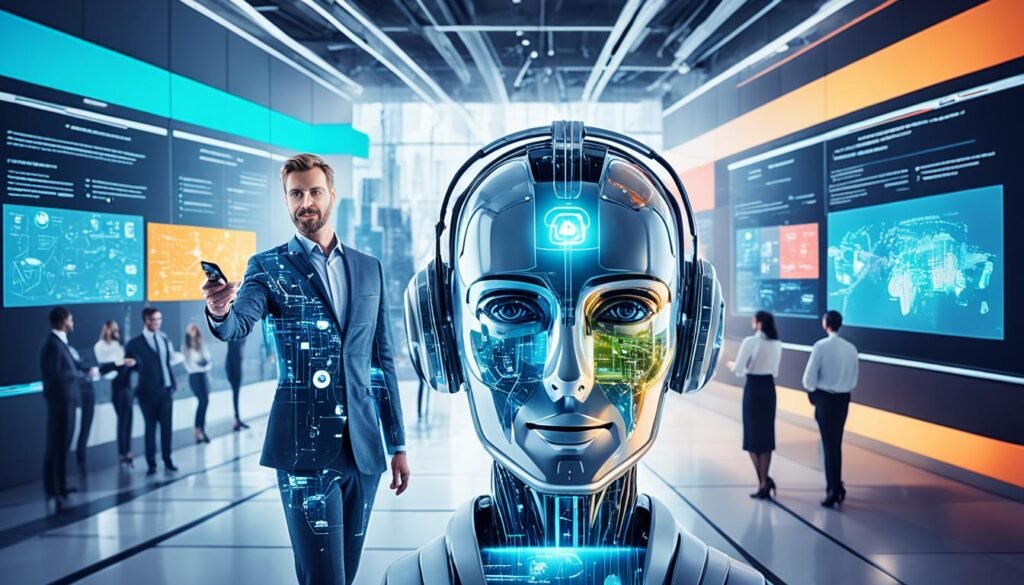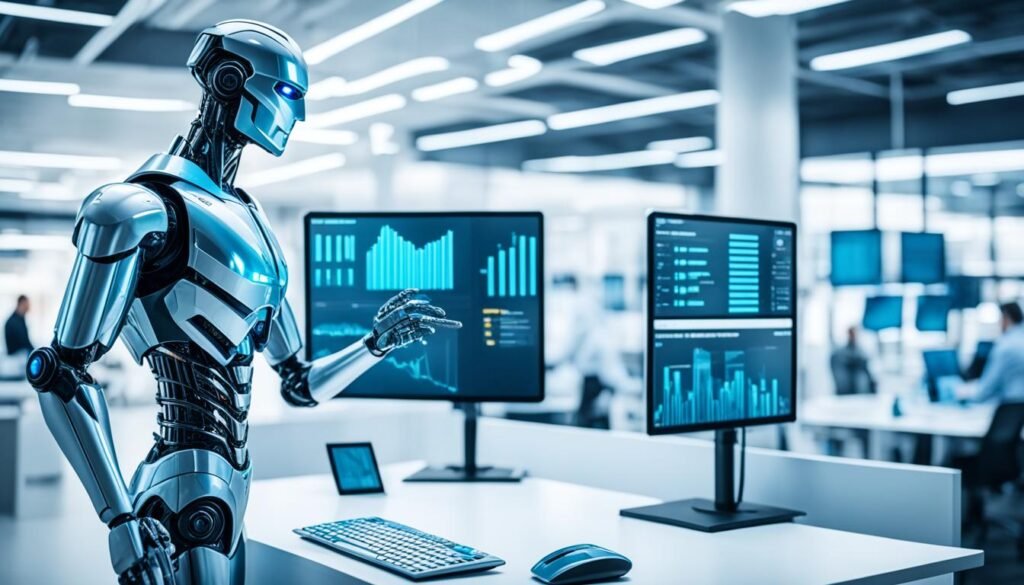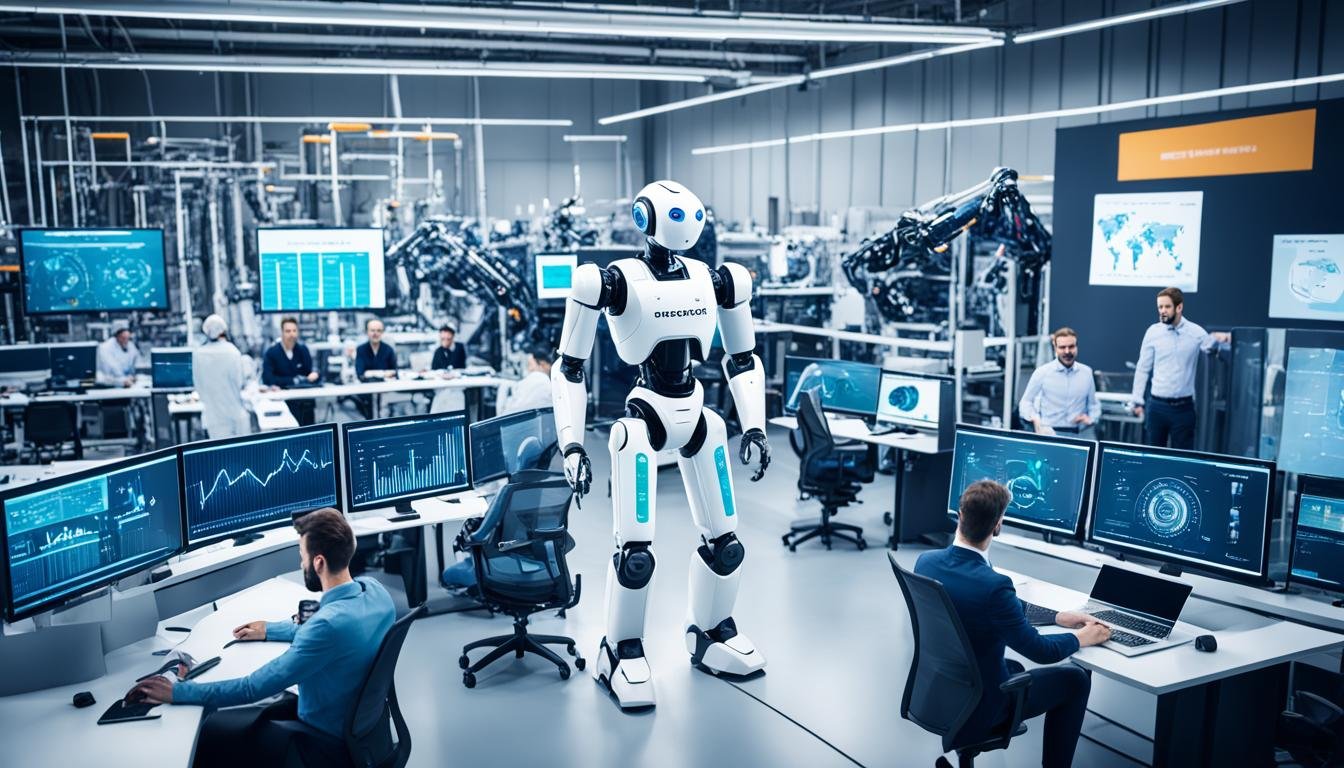The global AI market is expected to grow by 38.1% each year from 2022 to 2030, says Grand View Research. This shows how important artificial intelligence (AI) is becoming in business. Today, 77% of companies are either using or checking out AI, and 83% see AI as a key part of their plans.
AI could boost labor productivity by 1.5 percentage points over ten years. It could also make global growth 25% higher than without AI. Also, 56% of businesses use AI to make their operations better, 51% for cybersecurity, 47% for digital personal assistants, 46% for managing customer relationships, and 40% for managing inventory.
Key Takeaways
- Artificial intelligence is changing the business world, with a growth rate of 38.1% from 2022 to 2030.
- 77% of companies are using or looking into AI, and 83% see it as a top priority.
- AI can boost labor productivity by 1.5 percentage points and lead to 25% more global growth than without AI.
- Businesses use AI for many things, like making operations better, fighting cybercrime, managing customer relationships, and keeping track of inventory.
- The growing use of AI in businesses shows its big impact and the need for companies to understand it well.
The Transformative Power of Artificial Intelligence
Artificial intelligence (AI) is changing the business world fast. It’s not just about making tasks easier or replacing jobs. It’s about making people’s work better and opening up new ways to grow and innovate.
Exploring the Rapid Growth of AI in the Business World
Companies are quickly taking up AI. Studies show 77% of businesses are using or checking out AI. Also, 83% see AI as a key part of their plans, showing how important it is for their future.
Key Statistics on AI Adoption and Potential Impact
- AI could boost labor productivity by 1.5 percentage points over the next ten years, research says.
- AI could lead to nearly 25% more growth worldwide than automation alone, showing its huge potential.
- Companies use AI to make things run smoother, make better decisions, and give customers what they want, making them more efficient and competitive.
AI’s impact on business is clear. As more companies use this new tech, we’ll see more productivity, better data use, and happier customers. This will change how businesses work in the future.
“The future of business is being shaped by the rapid adoption of artificial intelligence. Companies that embrace this transformative technology will gain a significant competitive edge.”
how does ai affect business
Artificial intelligence (AI) has changed the business world a lot. It changes how companies work and talk to their customers. AI makes businesses more productive and helps with big decisions.
AI’s Far-Reaching Influence on Business Operations
More businesses are using AI to make things run smoother and stay ahead. In fact, 56% use AI to make their operations better. 51% use it to keep their businesses safe from cyber threats, and 47% use digital personal assistants powered by AI.
Also, 46% use AI to manage customer relationships, and 40% for keeping track of inventory. AI automates boring tasks and uses data to help companies work better, be more efficient, and make more money.
The Need for Responsible AI Development
As more businesses use AI, there’s a big push for responsible AI development. A huge 85% support making AI safe and secure. 81% think companies should spend more on making sure AI is trustworthy. And 85% want companies to be open about how they ensure AI is safe before selling products.
It’s important to develop and use AI responsibly. This means making sure it brings benefits without causing problems. By focusing on data privacy, avoiding bias in algorithms, and helping workers, businesses can use AI in a good way.

“AI is not merely about automation or replacing human tasks; rather, it’s about augmenting human capabilities and unlocking new possibilities for growth and innovation.”
AI’s Impact Across Industries: A Closer Look
Artificial intelligence (AI) has changed many industries, making businesses work differently. It’s affecting healthcare, mining, and banking in big ways.
The Impact of AI in the Medical Industry
AI is key in healthcare, making patient care better and operations smoother. A study says AI could save the healthcare industry up to $150 billion by 2026. It helps doctors make better diagnoses and tailor treatments for patients.
The Impact of AI in the Mining Industry
The mining industry is using AI to make things safer and more efficient. A Deloitte study found AI made data processes 18 times faster. AI helps miners spot dangers, get more resources, and cut down on risks.
The Impact of AI in the Banking Sector
Banks are leading in using AI to fight fraud, improve customer service, and make things run smoother. IDC predicts banks will invest a lot in AI by 2024. AI will add over $1 billion in value to the banking industry by 2035.
AI is changing how businesses work across different fields. It makes things more efficient, helps with making better decisions, and improves customer experiences. As AI use grows, its effects will get even bigger, shaping the future of business and society.
How AI Enhances Business Functions
Artificial intelligence (AI) is changing the game for businesses. It makes tasks easier and helps make better decisions with data. This tech is changing how companies work and talk to their customers.
Task Automation and Data-Driven Decision Making
AI automates boring tasks, giving people more time for creative work. This makes businesses run smoother and more efficiently. AI also helps by looking at lots of data fast, making it easier to make smart choices for growth.
Customer Experience Enhancement and Operational Efficiency
AI makes talking to customers better by understanding what they want. It uses smart tech to give them what they need and make service faster. Plus, AI can make things cheaper and run smoother, helping companies make new products faster.
But, AI isn’t a magic fix for every business. It needs to fit the company’s needs and goals. When used right, AI can open up big chances for success.
| AI Application | Business Impact |
|---|---|
| Task Automation | Increased operational efficiency and productivity |
| Data-Driven Decision Making | Informed, timely decisions that drive growth |
| Customer Experience Enhancement | Personalized, engaging customer interactions |
| Operational Efficiency | Reduced costs and accelerated innovation |

“AI is not a one-size-fits-all solution. Its effective implementation requires a deep understanding of a company’s specific needs, resources, and strategic goals.”
Artificial Intelligence and the Future of Work
Artificial intelligence (AI) is changing the business world fast. It’s making us wonder if it will take over jobs. Many people are talking about whether AI will make most jobs disappear.
Studies now say AI might automate some jobs but will also bring new ones. A McKinsey study found that even when AI takes over some tasks, people are still needed for things like managing, using special knowledge, and talking to others.
Addressing the Concerns About Job Displacement
AI’s arrival has made people worry about losing jobs. But experts think the effect will be more complex. A study by the Brookings Institution says AI and automation could replace 300 million full-time jobs worldwide by 2030. But, it could also create new economic activity of about $13 trillion, adding 1.2% to the global GDP each year.
Also, AI will be adopted slowly, with many companies taking time to use all five AI categories by 2030. This means workers and businesses have time to adjust to the new world.
- Automation will likely replace jobs that involve routine tasks, like following rules and doing clerical work, as well as jobs that deal with data and writing.
- But AI can also make people better at what they do by giving them better information and tools. This could lead to more productivity and new job chances.
- Government actions, like changing tax laws to help hiring and training, and rules to protect workers, could make AI work better for everyone.
As work changes with AI, it’s important for everyone to work together. We need to make sure AI’s benefits are shared fairly and deal with the job displacement worries.
The Environmental Impact of Artificial Intelligence
Artificial intelligence (AI) is changing fast and could change many industries. It could help fight climate change, but we need to think about its effect on the environment.
Training AI models uses a lot of energy, which is a big worry. Researchers at the University of Massachusetts found that training some AI models is like flying a lot or driving a car for a long time. The World Economic Forum says by 2050, we’ll have over 120 million metric tonnes of e-waste, and AI will be a big part of that.
But, AI could also have big benefits. It could help us reach 93% of environmental goals, like making cities greener, using less energy, and fighting pollution in oceans.
| Environmental Impact of AI | Potential Benefits of AI |
|---|---|
|
|
To make AI good for the planet, companies need to make AI responsibly. This means using less energy, using green energy, and recycling e-waste. We also need to teach people and make laws to deal with AI’s environmental issues.

“The rapid growth of artificial intelligence presents both opportunities and challenges in terms of its environmental impact. By addressing these challenges head-on, we can unlock the full potential of AI to combat climate change and create a more sustainable future.”
Embracing AI to Improve Business Operations
Businesses today are racing to stay ahead, and artificial intelligence (AI) is changing the game. By using embracing ai to improve business operations, companies can open up new possibilities. They can make data processing smoother and gain insights that boost their work.
AI-Powered Data Processing and Insights are changing how businesses make decisions. AI can learn fast, making it great for handling everyday tasks. This frees up people to focus on creative and strategic work. AI also helps by quickly processing and analyzing lots of data. This leads to smarter, quicker decisions, giving companies an edge.
- Using AI can make a workplace 20% more efficient by automating simple tasks and making decisions faster.
- Companies that use AI for their analytics see a 30% increase in making decisions based on data. This helps them stay ahead.
- Businesses using AI for predictive maintenance can save 40% on maintenance costs by fixing problems before they start.
By using embracing ai to improve business operations, companies can work better, save money, and make smarter choices. As AI becomes more common, companies that adopt it will do well in a changing business world.
“AI projects focusing on augmenting human capabilities rather than replacing them have shown better results, according to a study of 152 projects.”
AI in Business: Opportunities and Challenges
Today, businesses are using artificial intelligence (AI) to change how they work and stay ahead. AI helps improve customer service and makes cybersecurity stronger. It’s changing the game in many industries.
Customer Service and Cybersecurity Applications
A Forbes Advisor survey shows AI is big in business. Most use it for customer service (56%), cybersecurity (51%), and digital personal assistants (47%). AI chatbots and assistants are changing how companies talk to customers, offering quick and personal help.
In cybersecurity, AI is key in finding and stopping cyber threats. It looks at huge amounts of data to spot patterns. This helps AI systems quickly find and deal with security issues, keeping businesses safe from big attacks.
Enhancing Customer Experiences with AI
AI is also changing how companies talk to customers. A study says 73% use AI chatbots for messaging, and 61% use it to make emails better. Also, 55% use AI to give customers personalized services and advice, making their experience better.
AI’s Role in Business Process Optimization
AI is also making businesses more flexible and efficient. The research shows 53% use AI to improve production, 51% for automation, and 52% for SEO. This helps businesses work better.
But, businesses face challenges with AI, like relying too much on technology, worrying about the workforce, and AI making mistakes. It’s important to develop AI responsibly and encourage innovation. This will help businesses use AI’s benefits fully.
| AI Application | Usage Percentage |
|---|---|
| Customer Service | 56% |
| Cybersecurity and Fraud Management | 51% |
| Digital Personal Assistants | 47% |
| Customer Relationship Management | 46% |
| Inventory Management | 40% |

As more businesses use AI, those that embrace it will improve customer experiences, make their processes better, and stay ahead in the market.
The Rise of ChatGPT and Its Implications
ChatGPT, a cutting-edge language model from OpenAI, has quickly caught the eye of business owners. It’s set to change how businesses work. Entrepreneurs are keen to see what it can do.
Business Owners’ Perspectives on ChatGPT’s Impact
A recent survey found most business owners think ChatGPT will make a big difference. A huge 97% saw ways it could boost their business.
- 74% of business owners see ChatGPT helping with customer chatbots.
- 46% think ChatGPT will make talking to colleagues easier via email.
- 30% believe ChatGPT will create website content.
- 41% think ChatGPT will fix coding mistakes.
- 47% expect ChatGPT to translate information into many languages.
- 53% believe ChatGPT will save time by summarizing information.
Half of the respondents think ChatGPT will help with making better decisions. 44% plan to use it for creating content in different languages. This will help them reach more people worldwide.
Overall, business owners are hopeful about ChatGPT. They think it will make their businesses better in the next year. 90% believe it will have a positive impact.
“ChatGPT has the potential to change how we handle business tasks. From customer service to making content. We’re excited to see how we can use it.”
Responsible AI Integration: Addressing Concerns
Businesses are diving into the world of artificial intelligence (AI), but they face many ethical challenges. The benefits of AI are clear, but there are concerns that need attention for responsible use.
Technology Dependence and Workforce Concerns
Over 40% of business owners worry about relying too much on AI. They want a balanced approach. About 35% are worried about needing the right tech skills for AI. And 33% fear AI might cut down the human workforce, a big issue that needs careful thought and solutions.
Misinformation and Privacy Considerations
Businesses are also concerned about AI spreading false information. 30% worry about this, and 24% fear it could harm customer relationships. Also, 31% are uneasy about keeping data safe and private with AI, a key area needing strong rules and protection.
To tackle these issues, businesses must act proactively and comprehensively. They should set clear ethical rules, do thorough risk checks, and promote openness and accountability. By doing this, they can use AI’s power safely, reduce risks, and gain trust from everyone involved.
| Concern | Percentage of Businesses Affected |
|---|---|
| Technology Dependence | 40% |
| Workforce Concerns | 33% |
| Misinformation | 30% |
| Privacy Considerations | 31% |
“Establishing core ethical principles for AI deployment is crucial for businesses to ensure fairness, safety, and compliance with regulations.”
Conclusion
Artificial intelligence has changed the way businesses work and compete. It’s growing fast and being used in many industries. Companies use AI to make customers happier, work better, and manage things better.
But, there are worries like too much tech use, jobs lost, and privacy issues. Still, most business owners see AI as a big chance. They like AI tools like ChatGPT a lot. As AI gets better, businesses need to use it wisely to stay ahead in the digital world.
AI helps with chatbots and virtual assistants for better customer service. It also helps with making decisions using machine learning. By using AI, you can get ahead, work smarter, and give your customers the best experience.
FAQ
How does AI affect business?
AI is changing the way businesses work and compete. It helps companies improve customer experiences and make things more efficient. AI also helps streamline internal processes.
What are some of the key statistics on AI adoption and its potential impact on businesses?
The global AI market is growing fast, with a 38.1% annual growth rate from 2022 to 2030. Most companies are using or exploring AI. They see AI as a key part of their plans.
AI could boost labor productivity by 1.5 percentage points over ten years. It could also lead to a 25% higher growth rate than automation without AI.
How is AI being used across different industries?
AI is making a big impact in many industries. In healthcare, 38% of providers use AI for patient diagnoses. This could save up to 0 billion by 2026.
In mining, AI has sped up data processes by 18 times. The banking sector uses AI for fraud detection and improving customer service.
How does AI enhance business functions?
AI automates tasks, freeing up people for more creative work. It helps make better decisions by analyzing lots of data. AI also personalizes customer interactions, making them more engaging.
It can cut costs and make operations more efficient. This leads to a better customer experience.
Will AI lead to job displacement?
Research says AI will replace 16% of jobs but create 9% new ones in the U.S. by 2025. AI can automate some tasks but not all. Humans will still be needed for complex tasks.
What are the environmental impacts of AI?
AI can have good and bad effects on the environment. Training AI programs uses a lot of energy, which is bad for the planet. But, AI could help achieve environmental goals like creating green cities and fighting pollution.
What are the concerns businesses have about AI?
Companies worry about relying too much on AI and losing jobs. Over 40% fear becoming too dependent on AI. 35% worry about needing technical skills to use AI well.
33% are concerned about AI reducing the workforce. 30% worry about AI spreading false information.
How are business owners perceiving the impact of ChatGPT?
Most business owners think ChatGPT will be good for their businesses. They see benefits like helping with customer responses and making communication easier. They also worry about relying too much on technology and bias in AI.
They’re concerned about how it might affect the workforce too.
